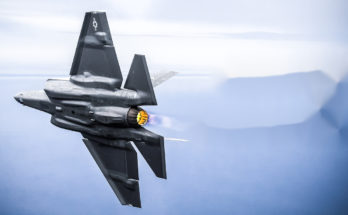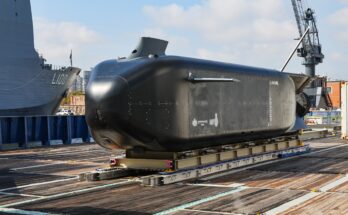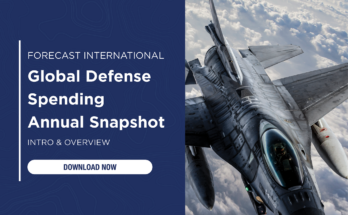by Derek Bisaccio, International Military Markets Analyst, Forecast International.

Egyptian President Abdel Fattah el-Sisi (R) meets with Russian President Vladimir Putin (L) in Cairo, December 2017. Source: Russian presidency website.
Earlier this month, La Tribune reported that France and Egypt are moving forward on negotiations for another sale of Dassault Rafale fighter jets to the Egyptian Air Force.[i] Cairo and Paris are said to be negotiating on a new agreement for the sale of up to two dozen Rafales to Egypt, on top of the initial group of 24 ordered in 2015. Furthermore, Egypt may procure another two Gowind 2500 corvettes and is interested in French drones and helicopters.
The deepening Egyptian-French relationship comes as the volume of U.S. sales to Egypt has waned. In 2013, in the months after the Egyptian military overthrew President Mohamed Morsi, the U.S. announced a hold on the sale of “certain large-scale military systems” and military assistance to Egypt, “pending credible progress toward an inclusive, democratically elected civilian government through free and fair elections.”[ii] The U.S. continued the sale of spare parts for previously supplied systems, but otherwise suspended the delivery of major hardware, largely in line with U.S. law regarding military coups,[iii] though the Obama administration did not formally acknowledge Morsi’s overthrow as such.
Less than two years later, the U.S. reversed its position. Notably, this decision followed the Egyptian presidential elections in 2014 that delivered 95 percent of the vote to President Abdel Fattah el-Sisi.[iv] Perhaps in recognition that President Sisi was here to stay, and worried about damage to the long-term U.S.-Egypt alliance, U.S. President Barack Obama announced in March 2015 that he would “lift executive holds that have been in place since October 2013 on the delivery of F-16 aircraft, Harpoon missiles, and M1A1 tank kits.”[v] This reversal in policy came without any of the intended changes in Egypt that the Obama administration had initially sought.
Even so, despite the end of the self-imposed suspension, the U.S. has for the most part not been able to cash in on major arms sales to Egypt. Maintenance and overhaul support continue, landing regular work for American firms, and some new deals have been reached. In September 2016, for example, the U.S. State Department approved the sale of eight MPQ-64F1 Sentinel radars to Egypt, and in November 2017, Raytheon received a contract to produce the radars for Cairo.[vi]
But since President Sisi took office, Egypt has turned to Russia and France for the big force modernization contracts. From Russia, Egypt purchased dozens of MiG-29M/M2 fighter jets and Ka-52 attack helicopters. The Egyptian military introduced Antey-2500 surface-to-air missile systems into service and is to procure T-90S/SK main battle tanks. France has sold Mistral helicopter carriers (initially destined for Russia) to Egypt, along with a FREMM frigate, several Gowind 2500 corvettes, and Rafale fighter jets. Further contracts with both countries are planned, and these sales will deepen Egypt’s bilateral relations with these countries for years to come.
Egypt’s turn to France and Russia for arms sales demonstrates several important features of the arms trade in general. President Sisi’s ability to buy from suppliers other than the U.S. limited Washington’s ability to directly pressure his decision-making on a sensitive subject, that being the nature of Egyptian elections. The success of a Muslim Brotherhood candidate in 2012 spooked the Egyptian military leadership, which in the aftermath of Morsi’s ouster has not been amenable to a repeat democracy experiment. The Brookings Institution’s Shadi Hamid observed that the 2013 massacre of supporters of deposed President Morsi signaled the end of the “Arab Spring” itself.[vii] Rather than bow to American pressure on an issue core to his domestic concerns, President Sisi chose to lessen his dependence on Washington by inking multibillion-dollar arms contracts with American arms competitors. Diversifying arms suppliers is a financially expensive endeavor and can lead to interoperability issues within a military and between partner militaries. But politically, it allows flexibility and preserves a measure of independence from any one supplier in particular.
Furthermore, American national security interests prevented Washington from more aggressively pressuring Cairo. The 2013 hold on arms sales noticeably exempted the supply of spare parts and support. Completely cutting off military assistance to Egypt was out of the question, however, as doing so would result in both short-term damage to the Egyptian military and long-term damage to U.S.-Egyptian relations. In the short term, Egypt’s military readiness would take a hit. Egypt is engaged in a counterinsurgency effort against Islamic State-linked militants in the Sinai and these operations would be negatively impacted were Egypt unable to continue receiving support for its American-supplied equipment. With quiet cooperation from Israel, Egypt has made use of heavy equipment in the Sinai, such as American-supplied F-16s and Apache helicopters,[viii] to combat militant groups. Over the longer term, as a direct consequence of meddling in Egyptian military readiness, the U.S. would have been perceived at best as an untrustworthy supplier and poor security partner, cementing an Egyptian shift to partners perceived to be more reliable. Washington’s ability to influence Egypt on humanitarian matters, always tenuous, would further erode.
In understanding of Egypt’s strategic importance, the U.S. is keenly interested in returning to the Egyptian market as part of a policy under U.S. President Donald Trump to promote arms sales, and may be able to score contracts with the Egyptian military, as numerous Egyptian modernization requirements remain. To do so, however, the U.S. may be seeking to limit Egypt’s ability to buy from both France and Russia. Dassault CEO Éric Trappier suggested in a March 2018 interview that he viewed American roadblocks to the sale of Rafales to Egypt as indicative of the U.S.’s desire to return to the Egyptian market.[ix] These blocks, according to La Tribune, which has followed Egypt-France arms deals closely, have since been lifted in the wake of high-level French protests, allowing the sale to move forward. At least in theory, Egypt could be subject to sanctions under the U.S.’s Countering America’s Adversaries Through Sanctions Act, which came into force earlier this year,[x] over purchases of Russian military equipment.
Given the benefit that President Sisi has found in diversifying suppliers, however, his government may react negatively to American efforts to cut Egypt off from other sources. U.S. pressure helped spur Egypt to seek other suppliers; it is doubtful that further pressure will undo this shift.

Derek Bisaccio has had a lifelong interest in politics and all things military. Currently, Derek is the editor of Forecast International’s International Military Markets – Middle East & Africa and International Military Markets – Eurasia Market Intelligence products.
[i] Michel Cabirol, “Armement : l’Egypte et la France à nouveau sur la même longueur d’onde,” La Tribune, July 9, 2018. Retrieved from
[ii] U.S. Department of State, “U.S. Assistance to Egypt,” October 9, 2013. Retrieved from http://2009-2017.state.gov/r/pa/prs/ps/2013/10/215258.htm
[iii] Arshad Mohammed and Patricia Zengerle, “U.S. Quietly Observes Coup Law on Egypt Aid, But Shuns Term,” Reuters, October 11, 2013. Retrieved from http://www.reuters.com/article/us-usa-egypt-aid/exclusive-u-s-quietly-observes-coup-law-on-egypt-aid-but-shuns-term-idUSBRE99B00C20131012
[iv] David Kirkpatrick, “International Observers Find Egypt’s Presidential Election Fell Short of Standards,” The New York Times, May 29, 2014. Retrieved from http://www.nytimes.com/2014/05/30/world/middleeast/international-observers-find-fault-with-egypt-vote.html
[v] The White House, “Readout of the President’s Call with President al-Sisi of Egypt,” March 31, 2015. Retrieved from http://obamawhitehouse.archives.gov/the-press-office/2015/03/31/readout-president-s-call-president-al-sisi-egypt
[vi] U.S. Department of Defense,” Contracts for Nov. 16, 2017,” November 16, 2017. Retrieved from http://www.defense.gov/News/Contracts/Contract-View/Article/1374724/
[vii] Shadi Hamid, “The Massacre That Ended the Arab Spring,” The Atlantic, August 14, 2017. Retrieved from http://www.theatlantic.com/international/archive/2017/08/arab-spring-rabaa-massacre/536847/
[viii] David Cenciotti, “For the First Time in 34 Years Egyptian Air Force Fighter Jets Flew Over Gaza-Israel Border,” The Aviationist, October 19, 2013. Retrieved from http://theaviationist.com/2013/10/19/egypt-f-16-sinai/
[ix] Anne Bauer, Bruno Trévidic, and Nicolas Barré, ” Éric Trappier, Dassault Aviation : ‘l’Europe doit s’organiser pour exercer sa puissance,'” Les Echos, March 15, 2018. Retrieved from http://www.lesechos.fr/15/03/2018/lesechos.fr/0301440884858_eric-trappier–dassault-aviation—–l-europe-doit-s-organiser-pour-exercer-sa-puissance–.htm
[x] Nicole Gaouette, “Russia Sanctions May Force US to Punish Key Allies,” CNN, February 8, 2018. Retrieved from http://www.cnn.com/2018/02/08/politics/us-allies-russia-sanctions/index.html
For 50 years, Forecast International intelligence reports have been the aerospace and defense industry standard for accurate research, analysis, and projections. Our experienced analysts compile, evaluate, and present accurate data for decision makers. FI's market research reports offer concise analysis of individual programs and identify market opportunities. Each report includes a program overview, detailed statistics, recent developments and a competitive analysis, culminating in production forecasts spanning 10 or 15 years. Let our market intelligence reports be a key part of reducing uncertainties and mastering your specific market and its growth potential. Find out more at www.forecastinternational.com



